Projects
|
‘Survivors, Protectors and Providers’ |
|
The United Nations High Commissioner for Refugees, UNHCR, works in partnership with the Centre for Refugee Research (CRR) to conduct a series of regional dialogues that will give refugee internally displaced person (IDP) and stateless women an opportunity to influence the decisions which affect their lives. ANCORW supports this project, which is part of the commemoration activities for the 60th anniversary of the Refugee Convention. |
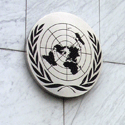
|
|
Dialogues were held in 7 locations around the world between December and May 2011 namely Delhi, Colombia, Jordan, Uganda, Zambia, Finland and Thailand. These dialogues seek to understand the key problems faced by displaced women and girls, what support is available to them, and what further support is needed. Women representatives from such dialogues attended high-level meetings at UNHCR in June and July 2011. The project played an important role in enabling refugee women to contribute what they would like to see governments pledging, at the ministerial-level meetings of state parties, to the 1951 UN Refugee Convention held in December 2011. These pledges were part of the UN commemoration activities for the 60th anniversary of the Refugee Convention. |
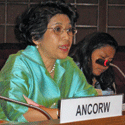
|
|
More information can be found at UNHCR and in a blog article, about the progress of such dialogues. |

|
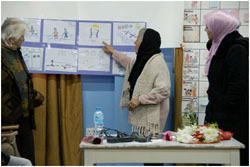 |
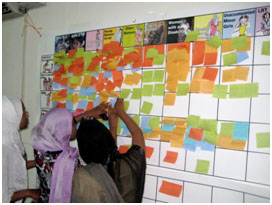 |
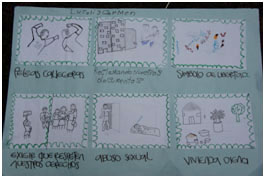 |
| Jordan Regional Dialogue | India Regional Dialogue | Colombia Regional Dialogue |
|
Dialogues with women and girls from refugee backgrounds in Australia |
|
In this project, a series of ‘dialogues’ with women from refugee background living in Australia provided a forum for them to share their concerns, aspirations, and ideas to improve the lives of refugee women and girls, both in Australia and around the world. Local community groups and organisations have hosted a dialogue with groups of refugee women in their local area from March – May 2011. These culminated in a National Women’s Dialogue as part of the 2011 Refugee Conference held at University of New South Wales in Sydney on June 14th, 2011. |
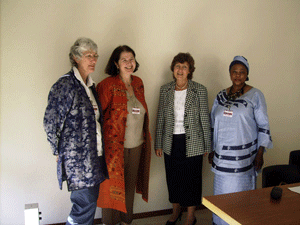
|
|
Why We Need A Women’s Dialogue in Australia |
|
Background To The Women’s Dialogues Project |
|
What will the dialogues achieve |
|
Information about the dialogues is available here |
|
International advocacy – ANCORW at UNHCR |
|
Every year, ANCORW organizes delegates travel to Geneva as part of the Australian advocacy team to the annual consultations of the High Commissioner for Refugees with the non government sector at UNHCR Geneva. ANCORW raises funds to enable women resettled in Australia to attend these important international meetings in order to advocate for the needs of their communities and rest of the refugee women. |
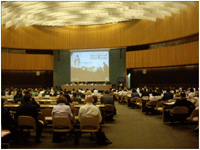
|
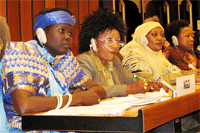
|
Aguil, Nava, Melika and Tenneh at United Nations Geneva |
|
ANCORW supports training and funding for grass roots refugee women’s organisations |
|
At the international level, ANCORW works with Centre for Refugee Research (CRR), through its international student internships to support the work of grass roots refugee women’s organisations and communities on the Thai-Burma Border and in India. CRR and ANCORW provide a range of training programs and raise funds to support the livelihood programs of grass roots refugee women's organisation on request. The livelihood programs provide services to women who have experienced violence and rape as they strive to support their families. |
|
Developing Education Resources : “Realising Refugee Rights: Refugees in Regional Areas in Australia” |
|
“We got our life back” |
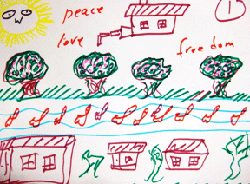
|
|
Improving settlement for refugee women - "Refugee Women at Risk: Protection and Integration in Australia" |
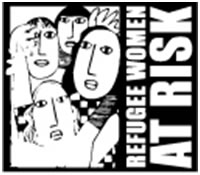
|
In partnership with the Centre for Refugee Research (CRR), ANCORW has undertaken research to explore the settlement experiences of refugee women at risk in Australia, funded as part of an Australian Research Council Linkage project grant.
|
|
The findings from this project have been presented at a number of national and international conferences and at the annual UNHCR consultations with NGOs in Geneva. As the current ARC (Action for the Rights of Children) is in its final stages, the research team has submitted an application to ARC to extend the project to the next phase, and to further develop the risk assessment tool in order to recommend an evidence-based policy response to support women at risk in their settlement. Unfortunately this application was unsuccessful, and ANCORW and its partners are considering other alternatives to complete this significant work. |
|
Improving settlement for refugee families – working with communities and service providers to address family conflict and breakdown |
|
In recent projects of ANCORW and the Centre for Refugee Research (CRR), issues of family conflict, violence and separation in settlement have arisen as amongst the most pressing and painful problems being experienced by refugee families and communities settling in Australia. Family issues are exacerbated by other challenges faced by new arrivals, such as inadequate and overcrowded housing, language difficulties, unemployment, financial stress, and the stress of adjusting to new physical and social systems etc. Conversely, familial conflicts contribute to the social, financial, housing and emotional pressures on resettling families, and adversely impacts physical and mental health along with education and employment. All these issues negatively impact refugee communities, refugee service providers and the broader community. |
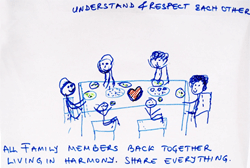
|
|
The consultations outcome and list of strategies suggested by staff and community members highlighted the correlation between family issues and other settlement challenges. Family problems cannot be separated from the range of settlement stressors and precipitants of family conflict. For this reason, a holistic approach to the problems within refugee families is necessary to ensure good outcomes for family members, and for the wider community. The reports from these consultations and recommendations for future action are posted on the CRR website after an approval from participants in the consultations. |
|
Developing education resources –“Celebration of refugee lives: stories of strength and resilience” |
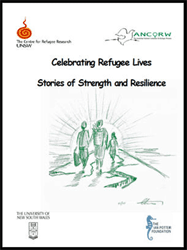
|
October 2009 saw the launch of a new educational resource toolkit developed by the Centre for Refugee Research (CRR), in partnership with ANCORW along with the financial support of the Ian Potter Foundation. The toolkit highlights the inspiring contributions and successes of refugees settling in Australia. It includes a film, a book of settlement stories of refugees and a short training program. The material was designed as a community educational resource to enhance the understanding of refugee experiences and to dispel the often damaging myths which impact upon resettling groups. The package is available through the CRR shop. |
|
Filming "Celebrating Refugee Lives" |

|

